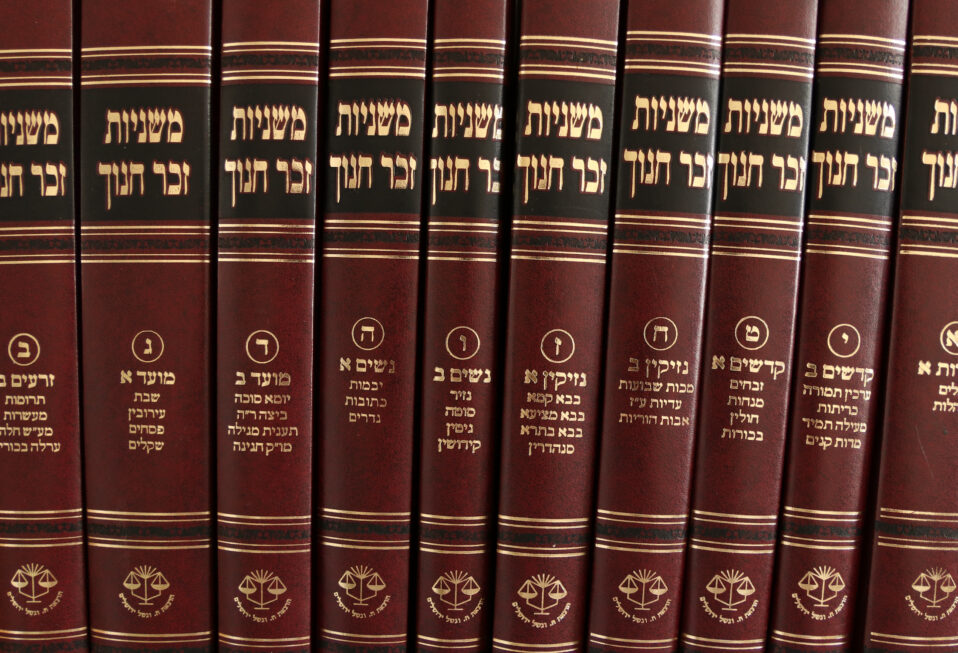At the beginning of the third century A.D., Rabbi Yehudah HaNasi (Judah the Prince) collected, organized, and edited the oral teachings and sayings of Jewish Sages into a single literary work known as the Mishnah. The Mishnah preserves many of the oral sayings—what was known as the Oral Torah—of Jewish Sages from the preceding four hundred years. Written in Hebrew, it served an important role in the process of reorganizing Judaism after the destruction of Jerusalem and the Temple in A.D. 70.
The three Jewish revolts which spanned from A.D. 66-136 deeply impacted Judaism and the oral preservation and transmission of teachings and instructions. Already in the second century A.D., some disciples began to form collections of their masters’ sayings. By the beginning of the third century, Judah the Prince collected, edited, and organized these smaller collections, as well as other oral traditions into the Mishnah. The name Mishnah comes from the Hebrew word meaning “to repeat,” stemming from the repetition necessary for disciples to learn orally the sayings of their teachers.
The Mishnah consists of sixty-three chapters, called tractates. They are organized into six divisions: Seeds, Festivals, Women, Damages, Sacred Things, and Cleannesses. Each division consists of tractates pertaining to specific topics within the broader subject. The instruction is legal focusing upon finer points of interpretation and behavior. The Mishnah does not present a singular or systematic viewpoint. Rather, it collects various rabbinic opinions, some of which disagree with others. Two opposite and contrary opinions are placed side by side within the text of the Mishnah. The opinions and instruction are not organized systematically; rather, it is organized associatively. This makes it difficult for non-Jewish readers to approach it at first.
Christian readers of the Mishnah often struggle to understand the text for a couple main reasons. First of all, Judaism, especially as organized by the Sages, focuses on orthopraxy, not orthodoxy. The New Testament reflects a similar orthopraxical outlook, yet as Christianity developed, its focus became orthodoxy. What does this mean? Judaism could take for granted that the members of its community believed in the God of Israel and the Jewish Scriptures. The focus, then, became right practice in obeying God’s commandments, as opposed to right belief.
Second, Christian readers often find the legal instructions, debates, and opinions in the Mishnah as pedantic and cumbersome. Such an assessment misses the point. The Jewish Scriptures, the Old Testament, have much to say about daily life, even in the small practical details, like how you weave your clothes. Faith and obedience to God should penetrate every area of one’s life.
The instructions in the Mishnah seek to spell out how one lives obediently in the minutia of life. Within the Mishnah itself, the Sages acknowledge what they are doing, even admitting God did not decree it all, but it was their way of forming, strengthening, and preserving a community deeply impacted by the Jewish revolts and the growing Jewish Diaspora.
Marc Turnage is President/CEO of Biblical Expeditions. He is an authority on ancient Judaism and Christian origins. He has published widely for both academic and popular audiences. His most recent book, Windows into the Bible, was named by Outreach Magazine as one of its top 100 Christian living resources. Marc is a widely sought-after speaker and a gifted teacher. He has been guiding groups to the lands of the Bible—Israel, Jordan, Egypt, Turkey, Greece, and Italy—for over twenty years.
Website: WITBUniversity.com
Facebook: @witbuniversity
Podcast: Windows into the Bible Podcast




Post a comment